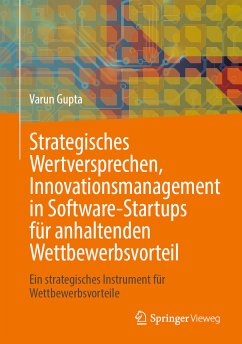
Strategic Value Proposition Innovation Management in Software Startups for Sustained Competitive Advantage (eBook, PDF)
A Strategic Tool for Competitive Advantage
Versandkostenfrei!
Sofort per Download lieferbar
64,95 €
inkl. MwSt.
Weitere Ausgaben:

PAYBACK Punkte
32 °P sammeln!
This book aims to increase the success rates of startups by focusing on value proposition innovation, which is propelled by the involvement of potential consumers as well as other resources such as freelancers and strategic relationships with academia. The author shows how startups who are resource constrained can invest efforts exploring the potential market of their products. The author also explores how global markets can be beneficial for a startup's success, while showing the workarounds in hard-to-access markets. The book investigates gaining knowledge shared by freelancers, customers, a...
This book aims to increase the success rates of startups by focusing on value proposition innovation, which is propelled by the involvement of potential consumers as well as other resources such as freelancers and strategic relationships with academia. The author shows how startups who are resource constrained can invest efforts exploring the potential market of their products. The author also explores how global markets can be beneficial for a startup's success, while showing the workarounds in hard-to-access markets. The book investigates gaining knowledge shared by freelancers, customers, and academia, whose involvement can be crucial in supporting value proposition innovation activities such as ideas generation, implementation, and commercialization. Combined, the author leads readers to discover their ability to foster value proposition innovations that result into long term competitive advantage in a highly fluctuating business environment.
Dieser Download kann aus rechtlichen Gründen nur mit Rechnungsadresse in A, B, BG, CY, CZ, D, DK, EW, E, FIN, F, GR, HR, H, IRL, I, LT, L, LR, M, NL, PL, P, R, S, SLO, SK ausgeliefert werden.












